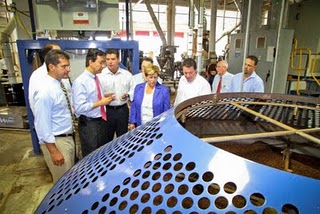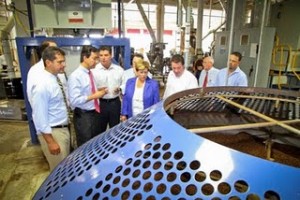New $15M coffee processing plant opens in Ponce


Puerto Rico Coffee Roasters executives guide Gov. Fortuño and other government officials through the newly opened coffee roasting plant in Ponce.
The island’s declining coffee industry got a shot in the arm Wednesday with the opening of Puerto Rico Coffee Roasters’ new $15 million roasting and distribution facility in Ponce that pursues revitalizing the sector and increasing manufacturing capacity to export the product.
The 120,000 square-foot plant is now the largest in the Caribbean and has the capacity to process 30 million pounds of coffee a year. The new operation occupies the former Café Rico facilities in Ponce. It generates 150 direct jobs and will help sustain more than 10,000 farmers and pickers who work along the island’s central coffee producing region.
In all, Puerto Rico Coffee Roasters has pumped $70 million into its coffee operation since entering the market in 2008.
“With this opening and the huge investment we have made, we demonstrate our confidence in the quality of Puerto Rican coffee, the people who produce and harvest it, and in the Puerto Rican consumer,” said Alberto de la Cruz, president of Puerto Rico Coffee Roasters, which produces a string of coffee brands including Café Yaucono, Café Crema, Café Rico and Alto Grande premium specialty coffee.
“The Puerto Rican coffee industry produces the highest quality grains that give the aroma and great taste to every cup that we drink. This is what distinguishes Café Yaucono, a leader in this industry, as the best coffee and ensures quality to all our brands,” De la Cruz said during a news conference at the plant that drew a contingent of municipal and central government officials.
Puerto Rico’s coffee industry is marking its 275th anniversary this year, preparing to tackle new markets and niches in an attempt to lift dwindling production numbers. It has been at least 25 years since the island last produced the amount of coffee necessary to meet local consumer demand, much less export it as it once did. While production in the 18th century probably reached 60 million pounds, this year’s crop will barely reach 10 million pounds, Agriculture Department figures show.
The industry’s seemingly unstoppable downward spiral is attributed to urban sprawl and a lack of workers willing to get paid for the grueling task of picking coffee. Still, coffee industry representatives agree that Puerto Rico’s coffee tradition and history can be revived and maintained, especially if the specialty coffee niche is developed.
Puerto Rico Coffee Roasters’ new plant houses inventory management to keep track of how much unripened coffee is in stock, modern machinery and controls to ensure quality in roasted and ground coffee, and the latest technology in equipment and packaging materials.
The company installed a modern laboratory to test and taste coffee through which the quality and consistency of its products are monitored, officials said during a tour of the plant.
“The purpose of this investment is to maximize the quality of coffee in Puerto Rico and strengthen our coffee industry, an industry with a 275-year legacy on the island,” De la Cruz said. “We will continue marketing Café Yaucono, Café Crema, Café Rico and all of our brands within Puerto Rico, as well as export them to the United States and other countries.”
 Joint effort to resuscitate sector
Joint effort to resuscitate sector
Gov. Luis Fortuño, Resident Commissioner Pedro Pierluisi and Ponce Mayor María Meléndez were among the government officials on hand for the inauguration of the plant being touted as one of the cornerstones of the coffee industry’s rebirth.
“Our goal is that coffee re-emerges as one of the island’s most economically and socially important agricultural sectors,” Fortuño said. “This opening represents the commitment of the private sector, which together with the government’s efforts, have been investing to create jobs on the island and to develop the coffee industry.”
In his comments, Fortuño outlined several measures his administration has implemented to benefit the coffee industry, including increasing the Agriculture Department’s budget by $6.5 million and assigning another $4 million to the agency’s coffee farms improvement program. Furthermore, the government disbursed some $3.7 million last year in fertilizer subsidies.
Meanwhile, the Agriculture Department is overseeing a pilot program through which it has selected a dozen test sites, or farms located at 1,200 feet above sea level or higher, with the potential to produce good coffee varieties and whose owners are willing to adopt environmentally friendly methods to begin raising the bar on local coffee quality standards.
The expectation is that in about two years, there will be at least 100 farms dedicated to harvesting specialty coffee, a niche that Puerto Rico must capitalize upon to survive, Agriculture Secretary Javier Rivera Aquino told News is my Business earlier this year.
In that sense, Puerto Rico Coffee Roasters is collaborating with the agency to develop a high-yielding coffee farming program through which beans would be picked manually and mechanically. As part of that effort, the company will work jointly with the University of Puerto Rico’s Experimental Station to establish a nursery to develop and monitor new coffee varieties that could be harvested.
Puerto Rico Coffee Roasters has also invested $630,000 in machinery and equipment to guarantee the best beans are picked and harvested for its Alto Grande premium product starting next year. The company also has allocated millions in working capital to ensure the availability of funds to purchase crops from farmers as they harvest the beans in their farms.












